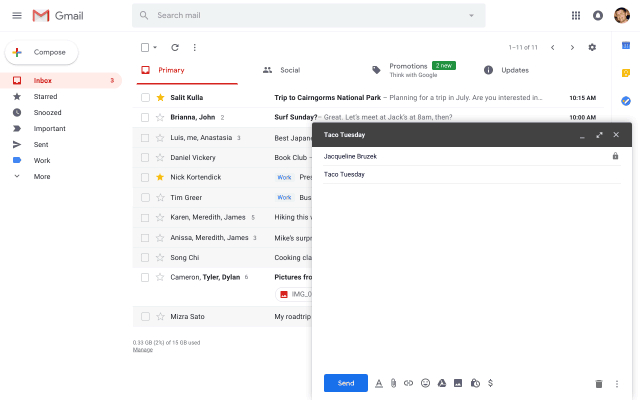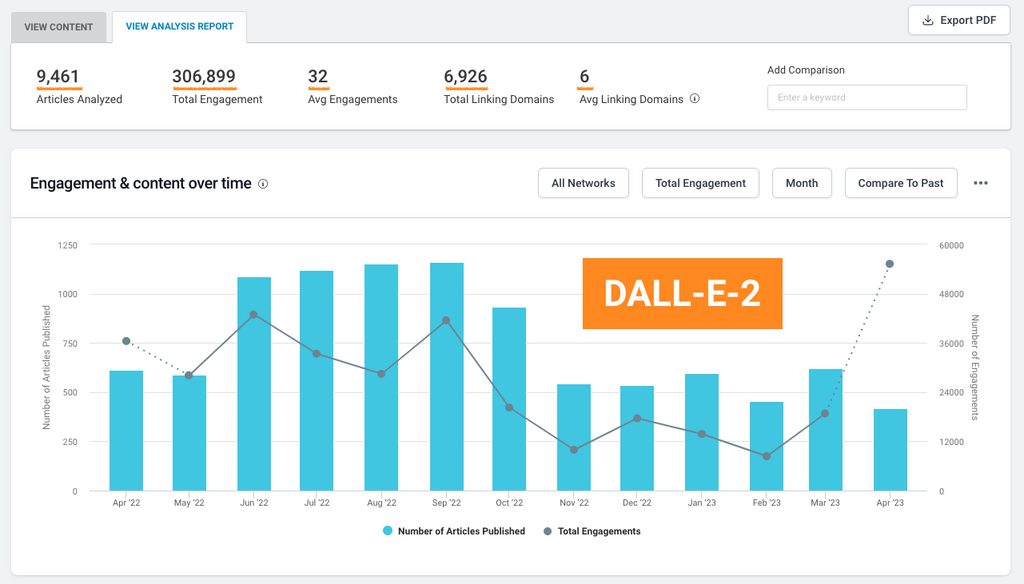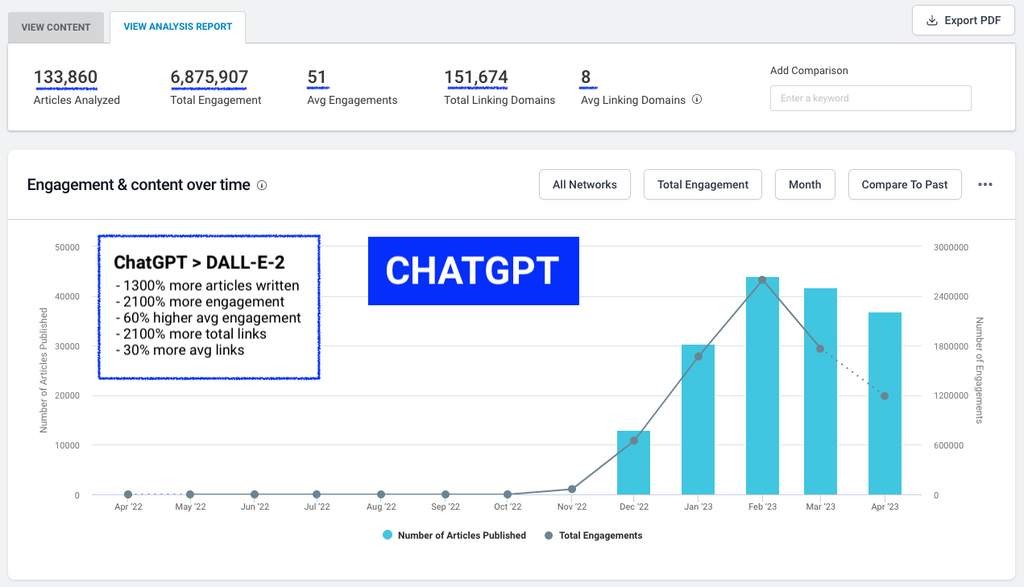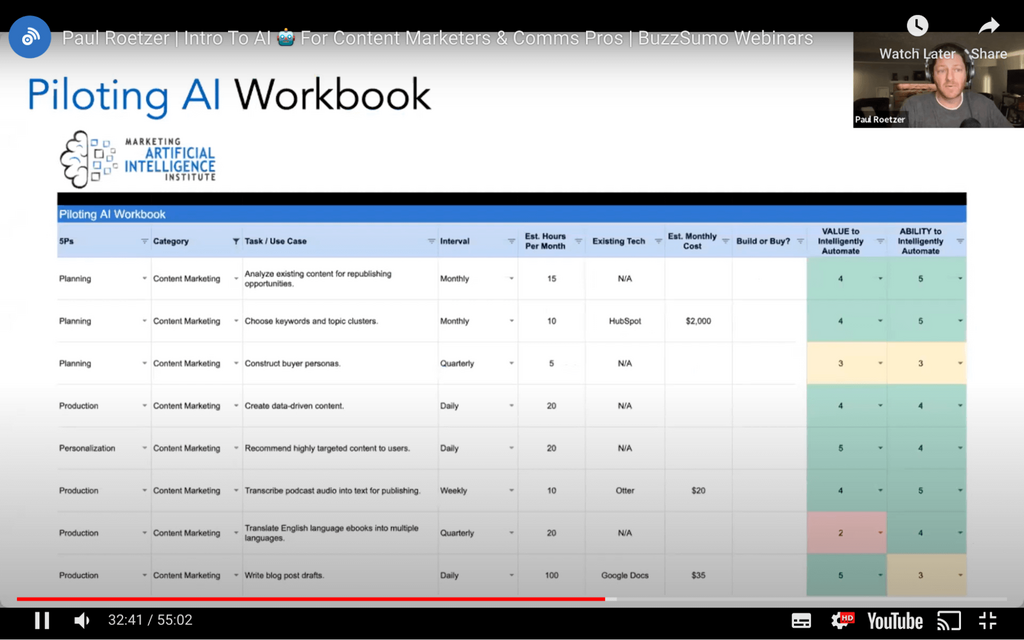There has been a lot of buzz surrounding artificial intelligence (AI) recently, and for good reason.
AI has the potential to transform entire industries, including PR, marketing, and communications.
In his AI webinar for BuzzSumo, Paul Roetzer, founder of the Marketing AI Institute, delivered a thorough introduction to AI for content marketers and communications professionals.
He explained that while there has been a surge of interest in AI, many people still lack a basic understanding of what it is and how it works.
The conversation centered around ChatGPT, the fastest-growing technology application in history, and its implications for the future of AI in marketing.
As Roetzer pointed out, AI is no longer just a buzzword – it's a game-changer.
Read on for a summary of the key points discussed in Paul’s webinar.
Full disclosure:
We have used ChatGPT to collate and create a fair chunk of this blog, using a human-in-the-loop approach (meaning everything has been copy checked and edited, and even spruced up by our team 🤓 ✨)
We did this by feeding ChatGPT the webinar transcript. Find some of the top takeaways below or watch the AI webinar here.
An Intro to AI: For Content Marketers & Communications Pros
AI has been a hot topic for a while now, and it's no surprise that more and more people are jumping on the bandwagon to learn about it.
In fact, website traffic for the Marketing AI Institute in January 2023 was up almost 100% compared to the previous year, and podcast downloads were up 800%.
And according to BuzzSumo’s own data, there has been a 4,000% increase in headlines surrounding the topic of AI since March 2021.
That's a lot of interest!
The situation with AI as it stands today
The truth is, many marketers and business leaders still have a limited understanding of what AI is and how it can impact their industry.
For some, their only experience with AI is through platforms like ChatGPT, which can finish your sentences or generate responses to your prompts.
The good news is that AI has already been a part of our daily lives for years, whether we realize it or not.
From Gmail's Smart Compose feature to Spotify's music recommendations, AI has been quietly working behind the scenes to make our lives easier and more personalized.
And this is only the beginning.
The growth of AI
According to our webinar guest, Paul Roetzer, the rate of innovation in AI is going to be almost incomprehensible in the coming years.
That means we can expect to see a lot more AI-powered software and applications in the marketing, sales, and service industries.
Roetzer cites a tweet from Sonya Huang, a partner at Sequoia Capital, identifying 30 generative AI tools in October 17, 2023.
By October 24th, a week later, they had identified 100 generative AI applications.
A month later, CB Insights joined the game, and created a 250 vendor map of generative AI tools.
The number of AI tools has skyrocketed to well over 1000 today, according to Roetzer.
One of the most exciting examples of AI in action is ChatGPT, which is a language model trained on a massive amount of data that can generate human-like responses to a wide range of prompts.
It's not hard to see why ChatGPT has been such a game-changer in the AI world.
In fact, within five days of its launch in November 2022, it had already gained a million users, and within 7-10 days, thousands of AI experts were flooding social media platforms to talk about how to use it.
Visual AI tool, DALL-E-2, also caused quite a stir last year if you'll believe BuzzSumo's content analysis.
Over 9K pieces of content were created surrounding the generative AI tool, earning a total of 300K+ engagements – or 32 engagements apiece.
But when you compare the two tools, it's clear to see just how big of an impact Chat GPT has had on the world...
As content marketers and communications professionals, it's important to understand how AI can help us create better content, reach our target audience, and improve the customer experience.
As AI tools continue to improve, they will become even more essential in our every day.
But how do you get up-to-speed with something as advanced as AI, and successfully work it into your every day?
Start small with AI pilot projects
Starting with test-bed projects is a great way to get going with AI.
So, how do you prioritize which AI pilot projects to start with?
It's a good question, and one that many companies are grappling with right now.
The key is to identify areas where AI can have the biggest impact – whether that's in content creation, customer service, or data analysis.
By starting small and testing the waters with pilot projects, businesses can gain valuable insights into how AI can help them achieve their goals and stay competitive in their industry.
How do you decide whether to use AI for a task?
Paul Roetzer offers two great frameworks for understanding when and how to use AI in your PR and marketing efforts.
1. Turn to AI if you have a problem or a use case
The first step is to apply a problem based model vs a use case model.
Turn to AI when you need help solving specific problems.
For example, if you need to boost email conversions, you might seek out an email marketing AI tool that takes learnings from your most successful emails (ie. ones with high open rates, click rates, open times, open counts, and other data points) to recommend improvements for future email sends – eg. subject line suggestions, send time changes, and so on.
With a use case model, you’re looking for opportunities to use AI as a quick-win way to optimize your day-to-day activities, or any recurring tasks.
For example, if you’re a content marketer you might want to use it to:
- Analyze existing content
- Optimize topic clusters
- Enrich buyer personas
- Translate English language content into multiple languages
- Write blog posts
- Transcribe podcast audio into text for publishing etc.
Work out what the value of automating those tasks will be, and score them accordingly.
Then consider time, resources, and budget to inform your investment.
Check out the Marketing AI Institute’s workbook template to help you get started with the use case model.
2. Turn to AI if your task is data-driven, repetitive, and prediction focused
To identify whether a task is suitable for AI, Paul Roetzer suggests asking yourself:
- Is my task data-driven?
- Is my task repetitive?
- Does my task involve making a prediction?
There are a whole host of content marketing use cases that fit the bill here – eg. analyzing existing content and automating copywriting.
When considering the value of intelligently automating a task, here’s some things to consider:
- How critical is this task to your team?
- How much revenue could it generate?
- Will it lead to audience growth?
- Will it create a better user experience?
For example, if you're currently spending 20 hours a month guessing at what content to recommend to users, and AI could help you be better at predicting what piece of content to recommend next, then that task is highly valuable and worth investing in AI technology for.
Become the go-to AI expert in your company
According to Paul, AI in education is far behind where it should be right now, meaning companies can’t rely on hiring new employees to fill the AI knowledge gap.
Instead they need to upskill their existing team members to pioneer AI exploration.
Becoming an AI-savvy marketer is a massive opportunity for PRs and marketers.
Roetzer states that, within a company, there is a need for a go-to AI person.
There is a big opportunity to create disproportionate value for the company, and forge a career path for yourself.
He predicts that 2023 will be the year where companies will come looking for people who understand AI, to lead AI projects.
Concerns and challenges surrounding AI
Of course, AI is not without its challenges.
One of the biggest concerns for many people is the potential for AI to replace human workers.
While it's true that AI has the potential to automate certain tasks and processes, it's also true that AI can free up human workers to focus on more strategic and creative work.
In fact, AI is often most effective when it's working in tandem with human workers, rather than replacing them altogether.
A challenge with buying AI technology is that the majority of vendors in the Martech landscape currently have no AI in their platforms or very limited features of AI.
According to Roetzer, we're now at a point where we're going to see a lot more AI infused into marketing and communications software in the future.
He also notes that ChatGPT has changed a lot of things for SAAS companies, and was a wake-up call for CEOs that their software may be outdated
Ethics in AI
During the webinar, a question was asked about the ethical component of creating content assisted by AI.
It’s crucial to understand what goes into AI-generated content, and identifying it as such.
Recently, CNET generated content written by AI but did not disclose this, and got penalized for it.
Roetzer states that companies need to develop a responsible AI policy for their organization, that clearly outlines how they will use AI tools and what the guardrails are.
Embracing the future of AI
In the end, the future of AI in marketing and communications is still being written.
But one thing is clear: AI is here to stay, and it's going to have a profound impact on the way we work, create, and connect with others.
As content marketers and communications professionals, it's up to us to stay informed and embrace the possibilities that AI can offer us.
By doing so, we can create more effective and engaging content, reach our target audience more effectively, and provide a better overall customer experience.
Watch the full webinar
If you found any of these insights interesting, check out these resources:
- Connect with Paul on LinkedIn
- Connect with Paul on Twitter
- Check out Marketing AI Institute
- Check out Paul’s Marketing Ai book
- Find out more about the AI for Writers Summit
- Check out the Marketing AI Conference (MAICON)
- Find out more about Paul’s Piloting AI for Marketers course
And for more great PR and content marketing insights, join our webinar series. Keep your eyes on our Marketing and PR Webinar page for upcoming guests and dates...
Categories
Digital PRCategories
Digital PRThe Monthly Buzz⚡
Subscribe to BuzzSumo's monthly newsletter to:
Stay up-to-date with the best of the best in content marketing 📝
Get data-informed content, tips and tidbits insights first 👩🏻💻
Read top shared content by top marketing geeks 🤓
Try
Enter any topic, term or url to search to see BuzzSumo in action. It’s free!
100% free. No credit card required.






